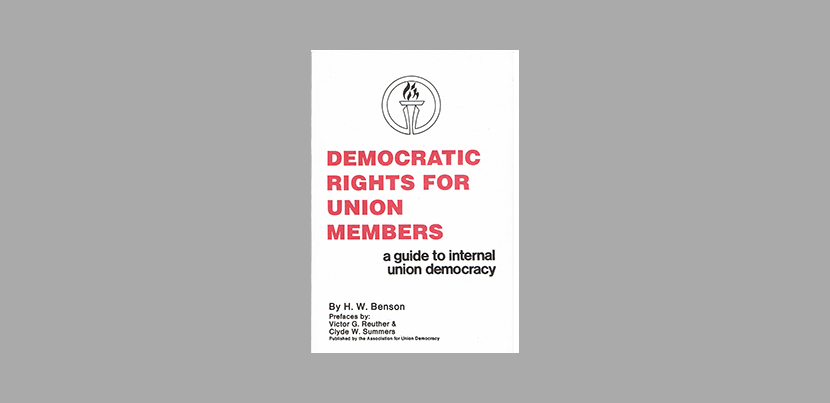Union Reform: It's Not A One-Person Show

The heart and soul of unionism is the membership. It is surprising how many would-be reformers must be reminded of so simple a fact.
Following is an edited excerpt from Democratic Rights for Union Members: A Guide to Internal Union Democracy (available for $12 at uniondemocracy.org), by the founder of the Association for Union Democracy. First published in 1979, this book remains as relevant as ever for those who are trying to reform their unions.
When you climb into the ring, it is not, presumably, just for exercise but to accomplish something: if you are proud of your union, you hope to keep it that way; if it is dominated by incompetent officials, even corrupt ones, you aim to replace them with others, more capable, more democratic, more honest.
Sending Crooks to Jail
“If only the D.A. would send those crooks to jail,” the frustrated reformer sometimes laments, “then everything would be O.K.”
Probably not. Without reform from within, a corrupt official is put away for a while; meanwhile, he is replaced by an identical twin; and sometimes he emerges from prison a few years later to start all over.
If you want only to protect yourself, you could go it alone; but to change the membership regime inside your union, you must go to the membership.
That basic rule should never be forgotten, for the heart and soul of unionism is the membership. It is surprising how many would-be reformers must be reminded of so simple a fact.
Unless you convince the membership, the union will end as it began before you started your campaign.
THE LONE RANGER
Union reform is not a one-man-band, do-it-yourself project.
A weary and oft-disappointed person is the lone-wolf reformer, usually a dedicated and sympathetic figure, who sets out to fix up their union, turns everywhere for help, but overlooks their own brother and sister unionists.
They study law and administrative procedures and knock on every door. They write mayors, governors, and representatives. They complain to the National Labor Relations Board, Department of Labor, state insurance department, human rights commission, legal aid services.
Occasionally they are turned away by calloused bureaucrats who won’t be bothered. More often they meet well-meaning public officials who simply don’t know what to do, overburdened and understaffed as they usually are.

SUPPORT LABOR NOTES
BECOME A MONTHLY DONOR
Give $10 a month or more and get our "Fight the Boss, Build the Union" T-shirt.
Long before our reformer walked into their office, these officials already knew that the world is oversupplied with unfairness, thieves, meanness, racketeers; to every tale of pilfered treasuries, they can add two counts of grand larceny. However, they also know how long and uncertain is the chain which begins with well-founded suspicions of illegality but must reach hard evidence, indictments, proof in court, convictions, and sentencing of malefactors. To make a good case, you need investigators, accountants, clerks, lawyers, and perhaps prosecutors.
Under continuing pressure to show maximum results in minimum time at lowest expense, officials prefer sure-fire, easy cases. Union reformers almost always come with hard cases.
WINNING TAKES ORGANIZING
When the round of appeals is over, our dogged lone reformer begins another. At their own expense, they hire a lawyer to begin proceedings. Sometimes they lose, sometimes they win, sometimes they effect an improvement. But it is usually only temporary. The status quo returns, because in their whirl of private activity they lacked time to reach other unionists.
In one way, they are right. It is essential—indeed it is—to find outside support. But our lone wolf really hopes for more than assistance; they are searching for someone, somewhere, outside the union to do what must be done within. In another way, then, they are dead wrong. They are so exclusively preoccupied with the quest for outside help that they forget the members inside.
God helps those who help themselves. Union democracy often requires organizing caucuses, handbilling, running candidates for office, gathering signatures on petitions, even court cases financed by many modest individual contributions. That kind of activity often wins public support where the lone individual can get only clucking condolences.
The best you can get from laws and government agencies, and the most you have a right to expect, is the opportunity of reaching the membership in democratic, honest elections. But nothing will win an election for you. It is up to you, and your supporters, to win over a majority.
The Three Elements
No one can reform a union without support from the members. But to reach the membership, and to guarantee that its decision will be respected, often requires assistance from outside the union.
The right of workers to choose leaders in honest elections—without which a free and democratic labor movement could not survive—has been successfully preserved because of three factors: 1. active union members, 2. backed by law, and 3. supported by civil libertarian allies.
That combination is indispensable for a vigorous internal democracy in the U.S. labor movement:
- Union activists above all, because without them nothing is possible. Yet if they are left to their own resources, without help, their efforts are often futile.
- The law, because the power balance inside unions is heavily weighted for the officialdom in relation to the membership. Yet too great a reliance upon the law, too deep an intervention by the government, would weaken the role of unionism as an independent force for workers.
- Allies from the community, because without assistance from pro-union intellectuals, lawyers, civil libertarians, and public leaders, the law will not be effectively implemented. Yet essential as these allies may be, their role is limited, for the main responsibility for union reform rests with union members and their elected leaders.
Buy Democratic Rights for Union Members for $12 at uniondemocracy.org. For an overview of the basic democratic rights of rank-and-file union members, see this handout from the Association for Union Democracy.



